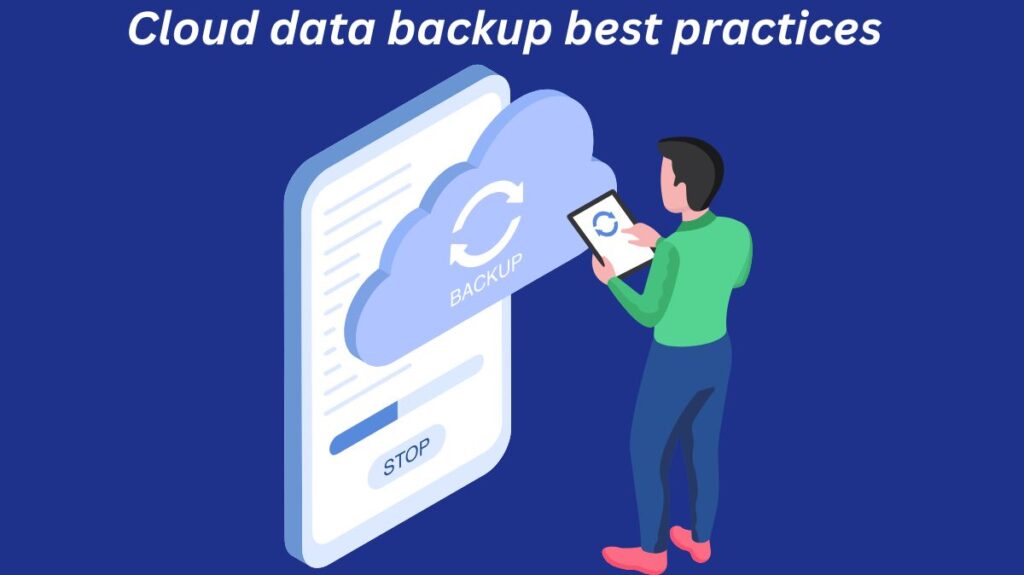Cloud data backup best practices

When it comes to deploying cloud backup in the organisation, there are a number of established best practices, despite the fact that methods, technology, and providers differ greatly. These are some rules:
- Know every detail of the service-level agreement (SLA) offered by the cloud backup provider, including how data is backed up and secured, the locations of vendor offices, and how expenses mount over time. Understand the boundaries of a provider’s accountability and how to get help and corrective action when needed.
- For backup, don’t depend on a single technique or data storage device. One of the basic guidelines for enterprise backups is still the 3-2-1 backup process.
- To make sure backup plans and data recovery protocols are adequate in the event of a disaster, test them. Verify backups and test recovery procedures on a regular basis to make sure staff members and technology are equipped to recover if needed.
- To ensure that processes are successful and uncorrupted, have administrators regularly check cloud backups.
- Select a location for data restoration that is convenient to reach and does not replace already-existing data.
- Depending on how important the information is to business operations, choose which particular data or files to backup. Since not all data is created equal, make backups that take into account the significance and worth of different kinds of company data.
- Make good use of metadata so that certain files may be quickly located and restored.
- For information that needs to remain private, think about utilising private encryption.
- Make sure that only essential data is backed up by using data management strategies and retention standards, particularly in the cloud where ongoing expenses can mount.
Special considerations
There are some other factors to take into account when selecting a cloud backup service provider. Not all cloud backup solutions can satisfy the unique data protection requirements of some businesses. The cloud backup service must be accredited as complying with GDPR or HIPAA data handling rules if a firm must comply. Despite having a cloud backup service, the client is still responsible for the data and may face fines and legal action if the provider fails to properly manage it.
Data preservation is another unique consideration when picking a cloud backup provider. Archiving differs from backup. Data that is no longer required but must be kept on file is known as archived data. Since that data is probably unaltered and needlessly adds to the number of backup data transmissions, it should ideally be eliminated from the daily backup stream. Typically, archival data is kept on devices like tape or underperforming disc systems that are designed for longer retentions and infrequent access. In general, archival storage like Azure Archive Storage or Amazon S3 Glacier is less expensive than data storage for live backups.
How to Choose a Cloud Backup Provider?
Ten Things to Think About the following are important factors to take into account while evaluating cloud backup providers:
Performance
It can differ throughout providers based on backup parameters such as network size, number of streams backed up in parallel, and cloud storage target performance. Make that the service you have selected satisfies both your recovery time target (RTO) and recovery point objective (RPO).
Security
Encryption and credential management are essential. Customers should ideally be able to leverage object locking, multiple cloud accounts, and private keys with cloud backup services. The backup data and the primary store should have a logical “air gap” to prevent threats like ransomware from compromising your backups.
Efficiency
Information should be transferred to and from the selected public cloud in an efficient manner. Some cloud backup systems use effective block-level data deduplication over the network in addition to WAN optimization. The service’s capacity to compress and deduplicate data while it is still on-premises before moving it to the cloud is a crucial component of backup efficiency.
Reliability
Assess the provider’s backup reliability promises. Find out from the provider where backups are kept and if they are shared with other services that can endanger your data.
Content management
A few suppliers offer value-added services including ransomware protection, e-discovery, search, and archiving. Keep in mind that some functions may incur extra fees.
Data mobility
The backup service should make it simple for you to transfer data between public cloud settings and on-premises locations. For instance, on-premises virtual machines must be modified or seeded with the necessary drivers before they can boot up in a public cloud. This degree of bare-metal support is crucial for cloud-based disaster recovery implementation.
Feature depth
The cloud backup features that each vendor provides should be taken into consideration. Examine each feature’s level of maturity in relation to more conventional data protection solutions. A cloud backup provider should ideally include managed backup features that enable customers to schedule backups in accordance with organizational requirements and automatically apply retention policies.
Cost
It might be difficult to calculate the expenses of data protection. Cloud providers frequently charge fees per gigabyte of stored capacity, with variable prices for different storage tiers and extra fees for data transfers outside of the public cloud.
Availability
In the event of a failure, backup providers usually offer a service level agreement (SLA) for availability and access time to your data. Make that the SLA satisfies the recovery time target (RTO) and recovery point objective (RPO) of your company, and if at all possible, bargain for a better SLA.
Coverage by geography
Determine the provider’s service location and the location of the actual data centre. Local users’ performance, compliance, and data sovereignty can all be impacted by data location.
Read more on What Is Cloud Backup? How It Work And Types Of Cloud Backup
Read more on Challenges, Advantages And Disadvantages Of Cloud Backup
Read more on Cloud Backup Security: Protect Your Data In The Cloud
